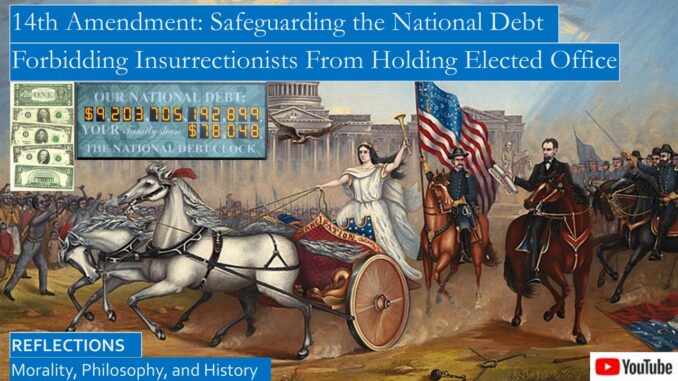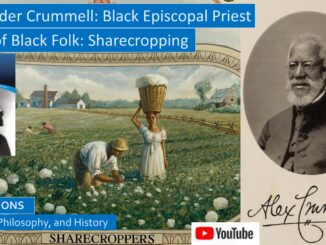
What are the unenforced sections of the Fourteenth Amendment?
Can the Republicans in the House of Representatives hold the world economy hostage over the debt ceiling negotiations?
Can the January 6th rioters be denied the right to hold public office?
Could the representation of the former Confederate states have been reduced when they passed the Jim Crow laws denying black citizens the right to vote?
Powerpoint script, with Amazon book links:
https://www.slideshare.net/BruceStrom1/unenforced-sections-of-the-14th-reconstruction-amendment-public-debt-and-insurrection
YouTube video for this blog: https://youtu.be/GoDYRQzFRhI
INTRODUCTION TO THE FOURTEENTH AMENDMENT
As Eric Foner puts it, “Together with far-reaching congressional legislation meant to provide former slaves with access to the courts, ballot box, and public accommodations, and to protect them against violence, the Reconstruction Amendments greatly enhanced the power of the federal government, transferring much of the authority to define citizens’ rights from the states to the nation.”.[1]
What were these Reconstruction Amendments?
- Thirteenth Amendment, ratified January 31, 1865: Slavery is abolished, except for convict labor.
- Fourteenth Amendment, ratified July 9, 1868: Everyone born or naturalized is a citizen of the US. All citizens are guaranteed due process under the law
- Fifteenth Amendment, ratified February 3, 1870: All citizens have the right to vote.
The Confederate states were compelled to adopt these Reconstruction amendments before they were readmitted to the Union after their defeat in the Civil War, and their state constitutions had to specifically abolish slavery.
Why were the three Reconstruction Amendments passed over a period of five years, rather than immediately after the Civil War? The simple answer is that even in the North there was not universal political support for due process for all citizens, and there were Northern states who did not give blacks the right to vote when the Civil War ended. On the eve of the Civil War, all states except for five New England states restricted the right to vote to white men.[2] Northern support increased for the Reconstruction Amendments after Northerners witnessed the intransience and hubris of the defeated Confederates and the violence and injustices suffered by the former slaves in the Confederate states.
UNENFORCED PROVISIONS OF THE FOURTEENTH AMENDMENT
The 14th Amendment has the most sections of the Reconstruction Amendments. Three of the sections have never been enforced.
Section 1: All persons born and naturalized in the United States are citizens, and all citizens are entitled to due process and equal protection under the law.
Section 2: NEVER ENFORCED: If a state denies the right to vote to a class of its citizens, its representation for the Presidential Electoral College and the House of Representatives shall be reduced.
Section 3. ENFORCED ONLY AFTER CIVIL WAR: Anyone guilty of insurrection or rebellion is disqualified from running for public office in not only the federal government, but also state and local elected offices.
Section 4. NEVER ENFORCED: Ensuring the validity of public debt of the United States.[3]
We have already discussed the first section of the Fourteenth Amendment, using Eric Foner’s book, The Second Founding, as our main source, but we have not been satisfied with the national media’s recent coverage of the unenforced sections of this Due Process Amendment. We are as expert as anyone on these unenforced sections because nobody can truly say they are an expert, because there is very little judicial precedent, and no enabling Congressional legislation, regarding these dormant provisions. We are using mainly Dr Wikipedia and recent magazine articles as sources, as Eric Foner’s book does not adequately cover these unenforced sections.
Second Founding: The Reconstruction Amendments to the Constitution:
http://www.seekingvirtueandwisdom.com/second-founding-the-reconstruction-amendments-to-the-constitution/
https://youtu.be/UciDV5laOLg
STATES DENYING SUFFRAGE WILL BE DENIED REPRESENTATION
The representation for the former Confederate States should have been reduced when the Jim Crow laws disenfranchised most black citizens after Reconstruction, but the support for civil rights among Northern Republicans flagged as many in the South threatened to restart the Civil War if Reconstruction was not ended.
The historical background was the disputed 1876 Presidential Election. There was widespread voter fraud in the Southern Confederate states, there was massive voter suppression by the Ku Klux Klan and other white supremacists, including actual and threatened violence against black voters, and there were even ballots discarded and ballot boxes stolen from many black majority voting districts. Just as in the 2020 election, both the Lincoln Republican and segregationist Democratic parties selected their own slates of electors in the contested states of Florida, Louisiana, South Carolina, and Oregon. In South Carolina, about a hundred and fifty black Republicans were murdered during the election, and the Democratic Party claimed there were more votes cast than there were voters.
Republicans recently used this incident as precedent, as they also elected their own slate of electors in the contested states in 2020. The difference between the illegal electors selected in these two elections is that the 1876 illegal electors were never prosecuted, although they are being prosecuted today. To avoid restarting the Civil War, Congress selected an Electoral Commission of both Senators and Congressman. The Northern congressmen agreed to withdraw federal troops from the South in exchange for the Southerners agreeing to accept that the Republican candidate for President, Rutherford B Hayes would succeed General Ulysses Grant as the next President.
Before the Civil War, slaves only counted as three-fifths of a person when counting the representation of the Southern states, but after the emancipation of the slaves, the Southern Confederate states would actually have increased representation for both the House of Representatives and Presidential electors. Therefore, under Congressional Reconstruction the Confederate states were compelled to pass the Reconstruction Amendments as a condition of being readmitted to the Union. Without this the Reconstruction Amendments would not have passed.
INSURRECTIONISTS BANNED FROM PUBLIC OFFICE
In the first Congressional elections after the Civil War, voters in many Confederate states elected former Confederate officials to office under the generous Presidential Reconstruction. In addition, the newly formed Southern governments enacted harsh black codes, which essentially re-enslaved the former slaves with oppressive legislation. The Union Congress refused to seat these congressmen and enacted Congressional Reconstruction, placing the defeated Southern states under military governments, requiring them to apply for readmission to the Union after suffrage was granted to former slaves, after Civil Rights legislation was passed by the state Legislatures, and after the states passed the Reconstruction Amendments.
After the Southern states were readmitted to the Union, a blanket amnesty was passed for former Confederate soldiers in 1872, and restrictions for the few hundred former Confederate officials were removed in 1898. After the 2020 election, there was litigation challenging whether Madison Cawthorn and Marjorie Taylor Greene could serve in the House of Representatives since they supported the January 6th insurrectionists. Cawthorn’s attorneys argued, and the Republican leaning federal judge agreed, that the Amnesty Act of 1872 applied prospectively to Cawthorn, but this was never appealed since he lost his bid for reelection. It is unclear whether MJT’s ruling was appealed. A New Mexico court did disqualify a participant in the January 6th riot from running for county commissioner.[4] We can expect future challenges when January 6th rioters run for political office.
VALIDITY OF PUBLIC DEBT OF UNITED STATES
Before the Civil War, the congressmen of the Southern states controlled most branches of the government. At the end of the Civil War, there was concern that if the Southern congressmen once again gained control of Congress, they would validate the Confederate war debt and invalidate the Union war debt, regardless of the economic consequences. After all, Andrew Jackson had previously dismantled the US Bank, which greatly damaged the US economy.
Thus, the Fourteenth Amendment, in addition to invalidating the Confederate war debt, declared that “the validity of the public debt of the United States, authorized by law, including” “payment of pensions”, “shall not be questioned.” Congress never passed enabling legislation for this section, as it was not needed.
There is a narrow Supreme Court decision that rules on this section. When FDR was compelled to abandon the strict gold standard during the deflationary economy of the Great Depression, the Supreme Court heard several Gold Clause cases, among them Perry v. United States, where they ruled that the section validating the public debt could be prospectively applied to future periods.
What was the origin of this odd notion that Congress would need to raise the public debt ceiling every so often? The House of Representatives controls the purse strings, it passes a appropriations budget that must be approved by the Senate. In addition, Congress also approved each issuance of Treasury bonds. But in the early twentieth century, they streamlined this process, and instead approved raising the debt ceiling every few years.
The raising of the debt ceiling only became a political issue when the Tea Party Republicans during the Obama Presidency decided to hold the economy hostage to demand unreasonable spending cuts. At this time, many legal scholars questioned whether this demand was constitutional under the 14th Amendment, but Obama, who was also a former law professor, did not want to set undesirable precedent, and agreed to unwise concessions so the Republican House of Representatives would raise the debt ceiling. Since they were burned by the prior debt ceiling crisis, President Biden’s position is his administration will not negotiate the debt ceiling itself, since it represents the shortfall created by both Trump’s tax cuts and the heavy expenditures required by the COVID crisis, it will only negotiate spending in the upcoming budget.
Ian Millhiser, attorney, author and correspondent for VOX, uses mob metaphors to describe this crisis: “House Republicans are currently trying to use the debt ceiling to extract policy concessions from President Joe Biden, and their pitch to Biden more or less boils down to ‘that’s a pretty nice economy you’ve got there, would be a shame if someone broke it.’ The idea is that, by threatening a debt default that would trigger an economic calamity, Republicans can force Biden to agree to spending cuts, such as cuts to Medicaid or rolling back much of Biden’s signature Inflation Reduction Act, that they could not obtain in a budget negotiation without this leverage.”
Is this Republican blackmail constitutional? Most scholars and the Justice Department do not think so, although there are some conservative scholars who disagree. And there is no Supreme Court precedent for this question. President Biden has publicly stated that the Fourteenth Amendment question is on the table.[5]
COULD PRESIDENT BIDEN SIMPLY DO WHAT NEEDS TO BE DONE?
These is precedent for the President to take needed action when an emergency threatens the security and well-being of the entire country. At the outbreak of the Civil War, Congress was not in session, and Maryland public officials threatened to disrupt the reinforcement of the capital by rail, which could have caused the North to lose the Civil War before it began. In addition, Lincoln himself had to be smuggled through Maryland some months prior when he assumed the Presidency.
By executive fiat, Lincoln suspended the writ of habeas corpus in Maryland, which meant that anyone supporting the Confederacy could be indefinitely imprisoned for the duration of the war. Maryland officials appealed to the Supreme Court, and the Confederate-sympathizing Supreme Court led by the Southern Chief Justice Roger Taney ruled that only Congress could suspend the writ of habeas corpus, which was an order that Lincoln ignored.
Most Southern Congressmen resigned at the start of the Civil War, so once the new Union dominated Congress convened, they quickly passed the Habeas Corpus Suspension Act of 1863, validating the actions of Lincoln.[6] The difference between this crisis and today’s debt ceiling crisis is today the Republicans control the House, while the legal justification for validating the public debt is much stronger.
The wild card question is: Today, how would the Republican Supreme Court rule on the validity of the public debt? We must keep in mind that in the Jim Crow years, the Southern dominated Supreme Court totally ignored the legislative intent of the Reconstruction Amendments. Would they simply ignore the legislative intent of the Fourteenth Amendment today as it applies to the public debt?
This question means President Biden may be forced to ignore any Republican failure to pass a clean debt ceiling by going down to the wire, allowing the stock market to tank, allowing the retirement accounts of millions of America to lose value, to possibly weather a credit downgrade of US debt, before simply declaring on national television that the US must pay its debts, whether the Congress agrees or not. These drastic consequences would hamstring the Supreme Court, they could then simply decline to hear the case, on the grounds that it is reluctant to rule on disputes between co-equal branches of government.
DISCUSSION OF THE SOURCES
In addition to Dr Wikipedia, we found that the VOX article by Ian Millhiser on the debt ceiling crisis to be an excellent legal history of the issues involved, he goes into more detail.
We also compared the January 6th lies that the election was stolen from Donald Trump to the lies by the playwright Aristophanes that Socrates was impious and corrupted the youth, lies which led to his unjust trial and execution after the end of the Peloponnesian Wars.
Socrates, Aristophanes and The Clouds, Capitol Riots, Georgia, and the Big Lie
http://www.seekingvirtueandwisdom.com/aristophanes-socrates-georgia-and-the-capital-riots/
https://youtu.be/Pn7wYntimjo
Pondering the Death of Socrates in Xenophon, Plato, and Aristophanes
http://www.seekingvirtueandwisdom.com/pondering-the-death-of-socrates-in-xenophon-plato-and-aristophanes/
https://youtu.be/Mip1vgRKH1E
We also compared whether the actions of Euthyphro, where he accused his father of the neglectful death of his slave in public court, to the son of the accused January 6th rioter who turned his father into the FBI, explaining his actions on CNN , on national television. Whether these were virtuous actions is a question that cannot be easily answered.
Plato: Euthyphro, Who Won’t Listen
http://www.seekingvirtueandwisdom.com/plato-euthyphro-who-wont-listen/
https://youtu.be/etK0eIpYPPg
[1] Eric Foner, The Second Founding (New York: WW Norton & Company, 2019), Preface.
[2] Eric Foner, The Second Founding, p. 5.
[3] https://en.wikipedia.org/wiki/Fourteenth_Amendment_to_the_United_States_Constitution
[4] https://theconversation.com/forgotten-insurrection-clause-of-14th-amendment-used-to-force-gop-members-of-congress-to-defend-their-actions-on-jan-6-181905 and https://www.forbes.com/sites/alisondurkee/2022/12/16/democrats-pursue-broad-effort-to-bar-trump-from-the-presidency-under-14th-amendment/?sh=96c3857743fc
[5] https://en.wikipedia.org/wiki/Fourteenth_Amendment_to_the_United_States_Constitution and https://www.vox.com/politics/2023/5/11/23712477/supreme-court-debt-ceiling-fourteenth-amendment-unconstitutional-kevin-mccarthy-joe-biden
[6] https://en.wikipedia.org/wiki/Habeas_Corpus_Suspension_Act_(1863)




1 Trackback / Pingback